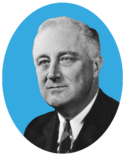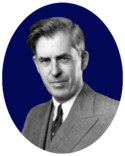1940 Democratic National Convention
|
1940 presidential election |
|
 
Nominees
Roosevelt and Wallace |
|
| Convention | |
|---|---|
| Date(s) | July 15–18, 1940 |
| City | Chicago |
| Venue | Chicago Stadium |
| Candidates | |
| Presidential nominee | Franklin D. Roosevelt of New York |
| Vice Presidential nominee | Henry A. Wallace of Iowa |
| Voting | |
| Total delegates | 1093 |
| Votes needed for nomination | 547 (majority) |
| Results (President) |
Roosevelt (NY): 946 (86.32%) Farley (NY): 72 (6.57%) Garner (TX): 61 (5.57%) Tydings (MD): 9 (0.82%) Cordell Hull (TN): 5 (0.47%) |
| Results (Vice President) |
Wallace (IA): 626 (59.3%) Bankhead (AL): 329 (31.17%) McNutt (IN): 68 (6.44%) Others: 32.5 (3.07%) |
The 1940 Democratic National Convention was held at the Chicago Stadium in Chicago, Illinois from July 15 to July 18, 1940. The convention resulted in the nomination of President Franklin D. Roosevelt for an unprecedented third term. Secretary of Agriculture Henry A. Wallace from Iowa was nominated for Vice President.
Despite the unprecedented bid for a third term, Roosevelt was nominated on the first ballot. Roosevelt's most formidable challengers were his former campaign manager James Farley and his Vice President, John Nance Garner. Both had sought the nomination for the presidency and soundly lost to Roosevelt who would be "drafted" at the convention. Henry Wallace was Roosevelt's preferred choice for the Vice-Presidency. His candidacy was opposed vehemently by some delegates, particularly the conservative wing of the party which had been unenthusiastic about Wallace's liberal positions. Nonetheless, Wallace was ultimately nominated with the votes of 59% of the delegates.
Throughout the winter, spring, and summer of 1940 there was much speculation as to whether Roosevelt would break with long-standing tradition and run for an unprecedented third term. The "two-term" tradition, although not yet enshrined in the U.S. Constitution as the 22nd Amendment, had been established by President George Washington when he refused to run for a third term in 1796, and the tradition was further supported by Thomas Jefferson. Roosevelt, however, refused to give a definitive statement as to his willingness to be a candidate, even indicating to his old friend and political kingmaker James Farley that he would not be a candidate again and that he could seek the nomination; Farley thus began his campaign.
...
Wikipedia
